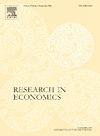同税同酬:拯救气候的公平高效之道
IF 1.2
Q3 ECONOMICS
引用次数: 0
摘要
我们证明,"同税同酬"(T&C)是公平的,因为它符合两个公平原则。它不同于任何固定一次性支付的皮古维税,可以激励每个国家实现世界福利最大化。它使目前人均排放量低于世界平均水平的国家受益,与排放受到适当惩罚和补偿的公平基准相比,它将使每个国家受益。通过人头税补贴减排是帕累托效率和帕累托改善现状,但并不公平。采用次优税率或金字塔税率的不完美 T&C 仍能造福世界。本文章由计算机程序翻译,如有差异,请以英文原文为准。
Equal tax and equal compensation: A fair and efficient way to save climate
We show that “equal tax and equal compensation” (T&C) is fair as justified by the two fairness principles. It differs from any Pigouvian tax with fixed lump-sum payments and can motivate every country to maximize world welfare. It benefits countries with current per capita emissions lower than the world average and would benefit every country when compared with a fair benchmark where emissions are duly penalized and compensated. Subsidizing emission reduction by poll tax is Pareto efficient and Pareto improving over status quo, but unfair. An imperfect T&C with a sub-optimal tax or pyramid taxes can still benefit the world.
求助全文
通过发布文献求助,成功后即可免费获取论文全文。
去求助
来源期刊

Research in Economics
ECONOMICS-
CiteScore
1.40
自引率
0.00%
发文量
37
审稿时长
89 days
期刊介绍:
Established in 1947, Research in Economics is one of the oldest general-interest economics journals in the world and the main one among those based in Italy. The purpose of the journal is to select original theoretical and empirical articles that will have high impact on the debate in the social sciences; since 1947, it has published important research contributions on a wide range of topics. A summary of our editorial policy is this: the editors make a preliminary assessment of whether the results of a paper, if correct, are worth publishing. If so one of the associate editors reviews the paper: from the reviewer we expect to learn if the paper is understandable and coherent and - within reasonable bounds - the results are correct. We believe that long lags in publication and multiple demands for revision simply slow scientific progress. Our goal is to provide you a definitive answer within one month of submission. We give the editors one week to judge the overall contribution and if acceptable send your paper to an associate editor. We expect the associate editor to provide a more detailed evaluation within three weeks so that the editors can make a final decision before the month expires. In the (rare) case of a revision we allow four months and in the case of conditional acceptance we allow two months to submit the final version. In both cases we expect a cover letter explaining how you met the requirements. For conditional acceptance the editors will verify that the requirements were met. In the case of revision the original associate editor will do so. If the revision cannot be at least conditionally accepted it is rejected: there is no second revision.
 求助内容:
求助内容: 应助结果提醒方式:
应助结果提醒方式:


